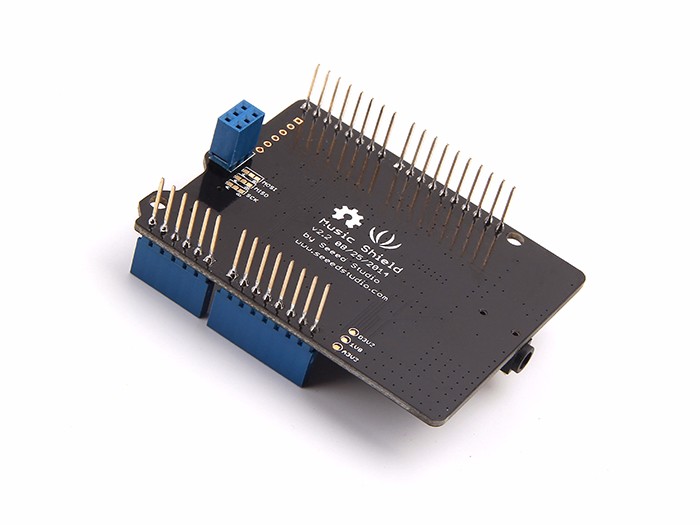Music Shield is an audio encoder/decoder compatible with Arduino, Seeeduino,
Seeeduino Mega and Arduino Mega. It is based on the VC1053B chip, which enabled
it to play sound files from SD card and do short-time recording as well.
This library is for MusicShield hardware version 2.0.
For hardware version 1.0, please visit the wiki page for demo codes.
The music player reads data from SD card and then feed into the VS1053 chip via SPI bus. This is done in TIMER1's ISR with a interval of 2ms. This job has a high priority and uses the cpu exclusively. In the spare cpu time, player does some process control, like play/pause.
-
Downlaod this library. Two way to do this:
a. click the "Download ZIP" link right down at this page;
b. use a git client to make a clone of "https://github.com/Seeed-Studio/Music_Shield.git"; -
Copy files(unzip if you downloaded a zip) into a dir named "MusicPlayer";
-
Copy dir "MusicPlayer" into Arduino IDE's library dir;
-
Coding guide:
(1) make sure SD lib and SPI lib was installed;
(2) include header files like example do;
(3) call player.begin() in setup() function;
(4) call other setup APIs or config APIs in setup() function;
(5) call player.play() in loop() function;
(6) call other config APIs in loop() function;
(7) then forget the music player and insert your own routine into setup() or loop() function, your own routine will be executed in available cpu time. -
Three different ways to play music:
a. play a song with its name by calling the function player.playOne(songfile);
b. add some songs into the default empty playlist(player.addToPlaylist());
c. play all the songs in SD card root dir by calling the function player.scanAndPlayAll().
a. Libs dependency: SD lib, SPI lib;
b. TIMER1 is used;
c. As the player need handling some control event(e.g.: key control, playlist processing ) circularly,
you should call player.play() in the arduino loop function. Otherwise, the player will not play;
d. ALL THE SONGS TO PLAY SHOULD BE IN THE ROOT DIRECTORY AND SONG NAME CAN NOT CONTAIN WIDE CHAR;
e. setup APIs can only be called in setup() function.
short press - toggle play and pause
long press (more than 2 seconds) - stop
long press in stop mode - record
short press in record mode - stop recording
short press left in play mode - shift to previous song
long press left in play mode - fast rewind
short press right in play mode - shift to next song
long press right in play mode - fast forward
short press up - volume plus 6
press up and hold - volume up continuously
short press up - volume minus 6
press down and hold - volume down continuously
Default setting:
play mode = NORMAL play
keys = ENBALE
scan available digit pins = DISABLE
scan available analog pins= DISABLE
create an empty playlist
-- global variables --
MusicPlayer player -- MusicPlayer class instance
-- setup APIs --
void MusicPlayer::begin(void) -- Music player initialization routine
void MusicPlayer::playOne(char *songName)
-- Add a song to play list , equivalent to call addToPlaylist once
boolean addToPlaylist(char *songName) -- Add a song to play list
void scanAndPlayAll(void) -- Scan all the songs in TF card and add them to play list
void attachDigitOperation(int pinNum, void (*userFunc)(void), int mode)
-- attach a callback to digital pin event
void attachAnalogOperation(int pinNum, void (*userFunc)(void))
-- attach a callback to analog pin event
-- config APIs --
void setVolume(unsigned char volume) -- setup volume (range: 0x00 - 0xfe )
void adjustVolume(boolean UpOrDown, unsigned char NumSteps = 6)
-- adjust volume up or down by step (UpOrDown=true for up)
void setPlayMode(playMode_t playmode)-- set play mode (modes: refer to keywords.txt Constants)
boolean deleteSong(char *songName) -- delete a song from play list
void keyEnable(void)
void keyDisable(void)
void analogControlEnable(void)
void digitalControlEnable(void)
-- operate APIs --
void play(void)
void opPlay(void)
void opPause(void)
void opResume(void)
void opStop(void)
void opVolumeUp(void)
void opVolumeDown(void)
void opNextSong(void)
void opPreviousSong(void)
void opFastForward(void)
void opFastRewind(void)
For more information, please refer to wiki page.
This software is written by Jack Shao ([email protected]) for seeed studio
and is licensed under The MIT License. Check License.txt for more information.
Contributing to this software is warmly welcomed. You can do this basically by
forking, committing modifications and then pulling requests (follow the links above
for operating guide). Adding change log and your contact into file header is encouraged.
Thanks for your contribution.
Seeed Studio is an open hardware facilitation company based in Shenzhen, China.
Benefiting from local manufacture power and convenient global logistic system,
we integrate resources to serve new era of innovation. Seeed also works with
global distributors and partners to push open hardware movement.


